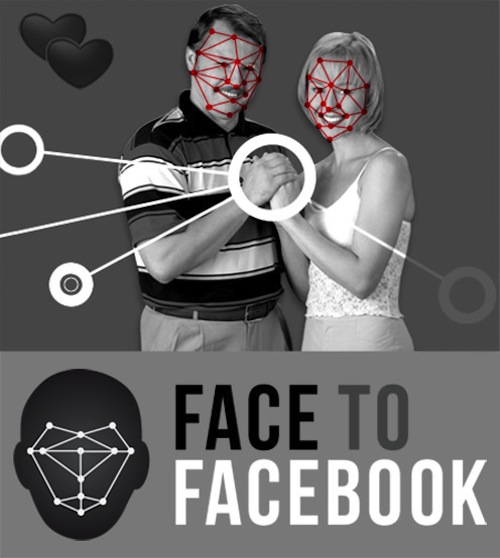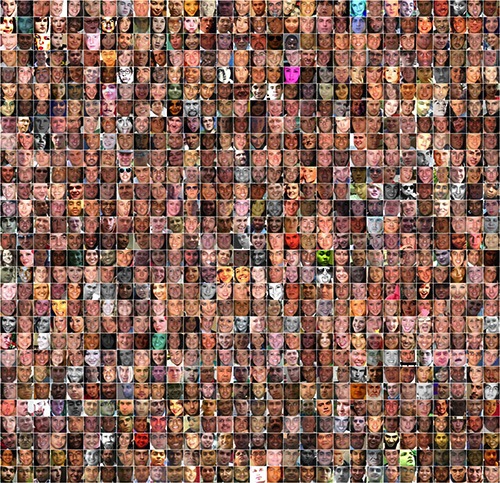 On February 2, 2011, Italian-born media artist Paolo Cirio launched the website Lovely-Faces in collaboration with media art critic Alessandro Ludovico. Lovely Faces had a five-day fling as a dating website, but unlike other sites of the matchmaking sort, users were unaware of their participation. Cirio made the profiles by secretly harvesting pictures from Facebook using a script he had created.
On February 2, 2011, Italian-born media artist Paolo Cirio launched the website Lovely-Faces in collaboration with media art critic Alessandro Ludovico. Lovely Faces had a five-day fling as a dating website, but unlike other sites of the matchmaking sort, users were unaware of their participation. Cirio made the profiles by secretly harvesting pictures from Facebook using a script he had created.
Over the course of two years, Cirio’s automated bot collected one million Facebook profile pictures from over fifty different countries. Face-recognition software helped reduce the collection to about 250,000 pictures of male and female faces. The jpegs were then sorted and arranged by facial expressions and a few other traits such as “likes.” During the short time the site was live, Cirio and Ludovico received eleven lawsuit warnings, five death threats, and several letters from Facebook’s lawyers.
Cirio is not against Facebook and maintains his own profile. (Facebook’s legal team warned that he would be permanently barred from the site but that hasn’t happened.) His motivation for the project was not to do Facebook harm but initiate public discourse about the social networking empire’s business tactics. At 1.1 billion users worldwide, Facebook has the monopoly on social networking. Cirio also pointed out that Facebook claims to own its users’ data, according to the site’s Terms of Service agreement. Cirio, however, abides by the 1980’s Cyberpunk slogan: “Information wants to be free.” Facebook does not agree.
Cirio and Ludovico’s first cease and desist order from Facebook’s legal team, dated February 4, 2011, requested the return of all data Cirio’s script had collected. Cirio and Ludovico’s lawyer countered, stating that since the duo had not used a Facebook account to collect data, it seemed preposterous that Facebook could be the rightful owner of the content. Cirio still can’t fathom how Facebook could truly own every picture of a cat or baby posted on its site. And why would it want to?
Cirio wants to hash out political issues about technology and privacy where they originate—online. A tinkerer since childhood, he believes “Technology is a battlefield for political issues, for better or worse.” His educational background in art and theater history, professional experience as a web designer and developer, and work with advertising agencies has given him plenty insight into the language of marketing. In Cirio’s performances he utilizes the conceptual and aesthetic framework of online networks as material that can be sculpted and reshaped.
Like Lovely Faces, much of Cirio’s work is an investigation of the aesthetics and functionality of online networks; they allow people to band together in unprecedented ways. People create units that have the ability to usurp the power of governments and corporations. People may organize themselves online by political preference; for instance, The Tea Party Movement gained momentum due in part to the group’s heavy presence on sites like Facebook. But Facebook still controls its users by imposing rules and a unilateral interface. “Today Facebook monopolizes not only the market, but also the potentials of social interactions,” said Cirio. Lovely Faces didn’t undercut the site’s foundation but may have, to some degree, undermined its authority.
Cirio was transparent throughout the ordeal with Facebook’s legal team. Cirio’s other website Face-to-Facebook explained in detail how Cirio and Ludovico made Lovely Faces. Cirio risked further legal action by doing this but felt that hiding his identity would have been an affront to the freedom of information he is committed to protecting. “It’s important for activists today to stand with their own names,” he said, “to inspire others to do the same for the sake of free speech.”
Paolo Cirio (b. 1979 in Turin, Italy) is a media artist living in Brooklyn, New York. In 2012, Cirio was a Fellow at the Eyebeam Art and Technology Fellowship in New York City. Face-to-Facebook is part of his Hacking Monopolism Trilogy, which also includes Amazon Noir and Google Will Eat Itself.





